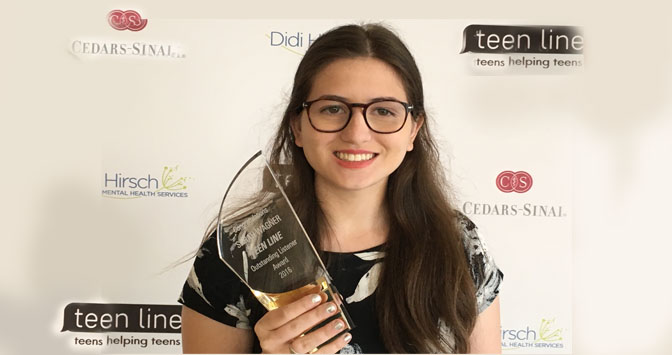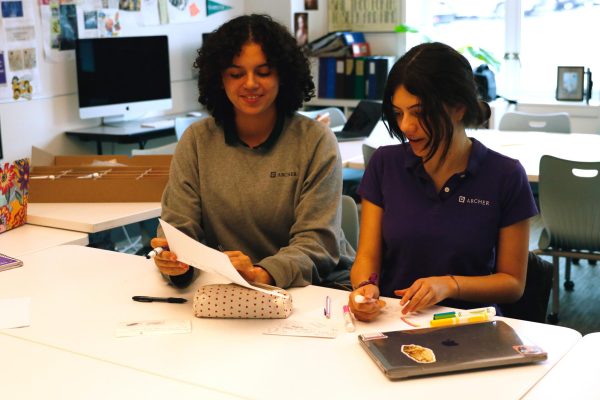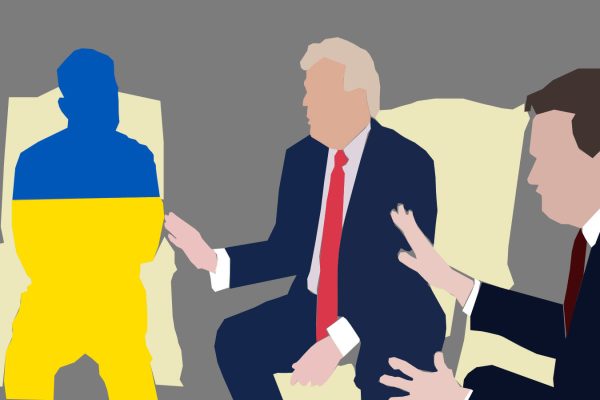Senior Sarah Wagner listens, TEEN LINE heard
Sarah Wagner holds her TEEN LINE 2016 Outstanding Listener Award. Wagner earned the award in April for devoting more than 515 hours to the confidential telephone helpline for California teenagers. Photo courtesy of Wagner
As a freshman, Sarah Wagner ‘16 decided to explore the world of extracurricular activities. With the many options to choose from such as sports or the arts, Wagner instead came across TEEN LINE, a confidential telephone helpline for California teenagers.

During the summer before tenth grade, she walked the halls of Cedars-Sinai Medical Center for the first time, both nervous and excited to meet new people and take on new responsibilities; but above all, ready to listen.
Prior to beginning her training period, like other TEEN LINE listeners, Wagner underwent a “careful screening process that includes the completion of a 5-page application, individual and group interviews, plus a parent-teen orientation meeting,” as stated in the TEEN LINE volunteer information page.
Additionally, the staff “carefully screen[s] and select[s] approximately eighty teenagers a year for hotline and outreach training. They complete a sixty-hour training program emphasizing specialized listening and communication techniques.”
From there, Wagner went through a two-month intensive summer training.
“First, you focus on active listening and how to not interject your own opinion and just hear what someone else is saying without giving advice of your own. After you get through that part, which in my opinion is the most important part, then you start learning about individual topics that come up in calls,” Wagner said. “You have different sessions on self-harm, eating disorders, child abuse and suicide. Suicide is especially powerful. They bring in a mother who lost their child to suicide, as well as a teen who has been suicidal.”
Before taking calls, Wagner sat in the in-between stage where she was an observer. As an observer, she wrote emails and participated in 15 mock calls with a trained mental health professional listening in.
“The training was extremely beneficial in giving [me] a great base; that’s when I really sort of gained those skills and learned how to actually talk to people because you can learn all you want, but you actually have to practice to learn how to listen effectively,” Wagner said.
After months of training, she took her first call, which was a conversation with an anti-social teenage boy who turned to the online world for friends.
“He was very difficult to connect with, especially since I didn’t have much experience with these difficult types of people who don’t connect often. It kind of went in spirals for a while, it was kind of disappointing,” she said.
She determined that he was not in any sort of danger and understood that he was not the type of person who sought help or interactions often.
“It just made me sort of doubt my abilities, but eventually, I took enough calls to realize there [are] different levels of where callers are at or how ready they are to talk. Really, it’s all about what [I] can do in the moment,” she said.
In general, listeners do not give advice, unless they see that the teen is in a dangerous situation.
Mostly what we’re doing is empowering them to make their own decisions, though we reflect back to them what they’re saying by putting it in different words to allow them to process it differently,” Wagner said.
With the different topics that come up during calls, listeners can become susceptible to internalizing others’ problems.
“I just came to the understanding somehow that I have a limit, but also that I can’t solve everyone’s problems. It’s not my role to do that. It’s my role to be an ear, and I’m not responsible for what’s going on in any way – I’m a source of help,” Wagner said.
“When I first started TEEN LINE, I didn’t really have a lot of friends who have gone through the sort of issues we deal with at TEEN LINE. When those issues started arising, maybe someone was self-harming or someone was suicidal, I knew how to deal with that, which you can’t know without really having this training.”
Additionally, the environment at the TEEN LINE office allows for listeners to have fun.
“There’s always laughter, music sometimes, jokes, or stories. It’s not at all a depressing vibe in the room. Sure, we’re handling intense calls, and we’re very focused on that, but we come back, and we’re not still in the call,” she said.
Mental health trained professionals are around to support the listeners.
“If you are having a difficult time, there’s always someone there for you,” she said.
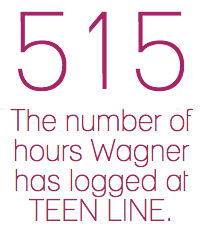 With flexible listening hours, Wagner said she easily balances her schoolwork with her work at TEEN LINE. In her nearly three years of volunteering at TEEN LINE, Wagner has logged over 515 hours.
With flexible listening hours, Wagner said she easily balances her schoolwork with her work at TEEN LINE. In her nearly three years of volunteering at TEEN LINE, Wagner has logged over 515 hours.
This past April, Wagner was awarded the 2016 Outstanding Listener Award.
“It’s something I look forward to doing. It’s not something I think of as a chore. That’s one of the reasons why I have as many hours as I do. I am excited to go in. I always feel good afterward, like I made a difference,” she said.
Since listeners consist solely of high school students, Wagner will finish her work with TEEN LINE before she attends the University of Southern California in the fall. However, she wants to engage in community service along the lines of mental health in the future.
“I just think TEEN LINE has made me much more conscious of my own life and just how it gives me a lot of perspective about my own problems, not to diminish them in any way,” she said. “I definitely want to do something in the future that allows me to continue putting my own life into perspective.”
For students interested in joining TEEN LINE, Wagner says to “just do it.”
“Especially at Archer, there’s a bubble that exists and in L.A. in general — but especially at Archer — you’re very caught up in your own problems, your own struggles of school and grades, and those struggles are very valid,” she said.
Whether it’s TEEN LINE or something else that breaks you out of your bubble, it’s one of the best things you can do,” Wagner said.
“You just wouldn’t have these conversations in any other context. It’s such an amazing thing. I’ve grown so much, and it’s been such an amazing feeling to be able to hear everyone’s stories,” she said. “Yes, it’s a time commitment. Yes, it’s a long training process; but there’s so much to gain from it that if at all it sounds appealing, just do it.”
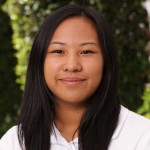
Carina Oriel graduated in 2016. She joined the Oracle staff in the middle of her junior year and became News & Features Editor for the 2015-2016 school...



